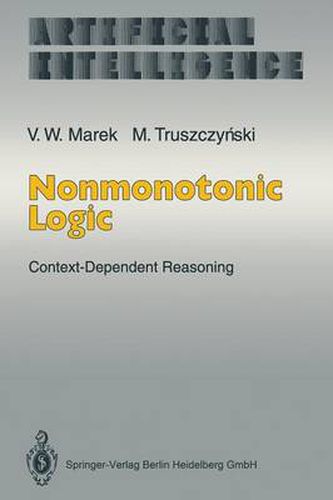Readings Newsletter
Become a Readings Member to make your shopping experience even easier.
Sign in or sign up for free!
You’re not far away from qualifying for FREE standard shipping within Australia
You’ve qualified for FREE standard shipping within Australia
The cart is loading…






This title is printed to order. This book may have been self-published. If so, we cannot guarantee the quality of the content. In the main most books will have gone through the editing process however some may not. We therefore suggest that you be aware of this before ordering this book. If in doubt check either the author or publisher’s details as we are unable to accept any returns unless they are faulty. Please contact us if you have any questions.
When I first participated in exploring theories of nonmonotonic reasoning in the late 1970s, I had no idea of the wealth of conceptual and mathematical results that would emerge from those halting first steps. This book by Wiktor Marek and Miroslaw Truszczynski is an elegant treatment of a large body of these results. It provides the first comprehensive treatment of two influen tial nonmonotonic logics - autoepistemic and default logic - and describes a number of surprising and deep unifying relationships between them. It also relates them to various modal logics studied in the philosophical logic litera ture, and provides a thorough treatment of their applications as foundations for logic programming semantics and for truth maintenance systems. It is particularly appropriate that Marek and Truszczynski should have authored this book, since so much of the research that went into these results is due to them. Both authors were trained in the Polish school of logic and they bring to their research and writing the logical insights and sophisticated mathematics that one would expect from such a background. I believe that this book is a splendid example of the intellectual maturity of the field of artificial intelligence, and that it will provide a model of scholarship for us all for many years to come. Ray Reiter Department of Computer Science University of Toronto Toronto, Canada M5S 1A4 and The Canadian Institute for Advanced Research Table of Contents 1 1 Introduction ………
$9.00 standard shipping within Australia
FREE standard shipping within Australia for orders over $100.00
Express & International shipping calculated at checkout
This title is printed to order. This book may have been self-published. If so, we cannot guarantee the quality of the content. In the main most books will have gone through the editing process however some may not. We therefore suggest that you be aware of this before ordering this book. If in doubt check either the author or publisher’s details as we are unable to accept any returns unless they are faulty. Please contact us if you have any questions.
When I first participated in exploring theories of nonmonotonic reasoning in the late 1970s, I had no idea of the wealth of conceptual and mathematical results that would emerge from those halting first steps. This book by Wiktor Marek and Miroslaw Truszczynski is an elegant treatment of a large body of these results. It provides the first comprehensive treatment of two influen tial nonmonotonic logics - autoepistemic and default logic - and describes a number of surprising and deep unifying relationships between them. It also relates them to various modal logics studied in the philosophical logic litera ture, and provides a thorough treatment of their applications as foundations for logic programming semantics and for truth maintenance systems. It is particularly appropriate that Marek and Truszczynski should have authored this book, since so much of the research that went into these results is due to them. Both authors were trained in the Polish school of logic and they bring to their research and writing the logical insights and sophisticated mathematics that one would expect from such a background. I believe that this book is a splendid example of the intellectual maturity of the field of artificial intelligence, and that it will provide a model of scholarship for us all for many years to come. Ray Reiter Department of Computer Science University of Toronto Toronto, Canada M5S 1A4 and The Canadian Institute for Advanced Research Table of Contents 1 1 Introduction ………